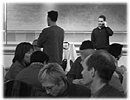Workshops: Description

Photo Credits
Experienced professionals offer in-depth training at pre-conference workshops. Explore topics at an advanced or elementary level.
| Workshops |
| Sessions |
| Speakers |
| Interactions |
| Demonstrations |
| Exhibits |
| Best of the Web |
| produced by
|
| Search A&MI
|
| Join our Mailing List Privacy Policy |
Evaluation of Educational Benefits in Advanced 3-D Learning Rnvironments
Nicoletta Di Blas, Politecnico di Milano, Italy
Paolo Paolini, Politecnico di Milano, Italy
Caterina Poggi, Politecnico di Milano, Italy
Workshop: 3-D Evaluation
This workshop examines evaluation criteria to be applied to 3D applications for cultural heritage, stressing the relationship between goals and accomplishment. Does the application achieve the deep cultural goals it was designed for? Do all its features (graphics, interaction, semiotics) cooperate to this end?
We find many Cultural Heritage applications have fallen victim to a fallacy that 3D graphics must reproduce reality as carefully as possible. The result is certainly of high quality, in terms of "aesthetic" rendering, but does the application teach something? Do users feel engaged? Are the interaction possibilities fully exploited?
We claim that "be as realistic as possible" is a commandment whose fulfillment seldom results in an effective learning experience. On the other hand, 3D graphics can be highly effective if designed in order to comply with deep cultural and relational goals, on which the graphic, the interaction paradigms, the overall organization of the experience must depend.
Examples will be taken from projects developed by the instructors' laboratory, whose efficacy has already been demonstrated through a number of successful experimentations, involving more than 1400 students and teachers in Europe and Middle East: SEE- Shrine Educational Experience, (in cooperation with the Israel Museum); Learning@Europe (in cooperation with the International Accenture Foundation) and Storia@Lombardia (in cooperation with the Regional Government of Lombardy). Examples from the attendees' projects will be welcome for discussion.
Please note that elicitation of the goals and requirements for 3D applications will be addressed by the workshop "Introducing advanced learning paradigms for 3D environments" (half-day workshop, morning).
Target audience
- Cultural Heritage managers and researchers interested in advanced ICT applications;
- Developers of applications for educational purposes;
- Teachers.
Learning objectives
At the end of the workshop, participants will be able to:
- Evaluate the cultural/educational value of advanced cultural heritage applications;
- Better understand the impact of e-learning educational applications.
Syllabus
14.00-14.45: Educational benefits; Taxonomy of educational benefits for cultural heritage applications.
14.45-15.30: Try yourself! Participants will be asked to take part in an interactive 3D experience and to critically discuss it.
15.30-16.00: Coffee break
16.00-16.30: Evaluation methods; How to evaluate the educational benefits related to knowledge, skills and attitude. How to measure the cultural "habit change".
16.30-17.00: Discussion; Wrap up and open discussion
April 2005
analytic scripts updated:
October 2010
Telephone: +1 416 691 2516 | Fax: +1 416 352 6025 | E-mail:
